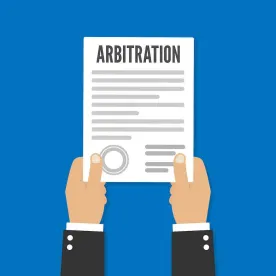On June 3, 2021, in Donelson v. Ameriprise Financial Services, Inc.,1 a panel of the U.S. Court of Appeals for the Eighth Circuit ordered class-action allegations in a putative securities fraud class action stricken on the pleadings under Rule 12(f) of the Federal Rules of Civil Procedure, and directed the matter to arbitration. The decision is significant not only for its broad application of an arbitration clause to federal securities fraud claims, but as a rare appellate-level endorsement for striking class allegations under Rule 12(f)—which permits a court to strike from a pleading “an insufficient defense or any redundant, immaterial, impertinent, or scandalous matter”—prior to class discovery and a motion for class certification. More widespread adoption of the Eighth Circuit’s approach would offer courts a powerful mechanism to dispose of inadequate class claims early in a case, while conserving judicial resources and reducing undue settlement pressure from the costs and uncertainties of class discovery and the class certification process.
Background
The plaintiff in this case is Mark Donelson, a high school graduate and Sam’s Club employee who had no formal training in securities trading. In 2010, Donelson’s investment advisor, Mark Sachse, told Donelson he was joining Ameriprise Financial Services, Inc. and asked Donelson to open an investment account with his new firm. Donelson and Sachse met at a restaurant, where Donelson signed an Ameriprise account application. The application included an acknowledgement in small print that the applicant had “received and read” a separate “Ameriprise Brokerage Client Agreement for Non-Qualified Brokerage Accounts” and “consent[ed] to all these terms and conditions with full knowledge and understanding of the information contained in the [client agreement],” including a “predispute arbitration clause.” The arbitration clause in the client agreement, which Donelson allegedly never saw, read, or signed, provided for arbitration of “all controversies that may arise between us,” except for a “putative or certified class action.” Thereafter, Sachse allegedly engaged in improprieties in handling Donelson’s investment account, including misrepresenting the account value, improper trading, and misrepresenting reparations for problems with the account.
Alleging that other Ameriprise clients experienced similar improprieties, Donelson filed a putative class action against Sachse, Ameriprise, and Ameriprise officers in the Western District of Missouri, asserting claims for violations of Section 10(b) of the Securities Exchange Act of 1934 and Rule 10b-5 thereunder, control person liability under Section 20(a) of the Exchange Act, and breach of fiduciary duty under Section 206 of the Investment Advisors Act. The defendants moved to strike the complaint’s class-action allegations under Rule 12(f) and to compel arbitration, and the district court denied the motions. Applying Missouri law, the district court concluded that there was no meeting of the minds concerning arbitration, given that Donelson did not receive or sign the client agreement with the arbitration clause, and, in any event, the agreement was “illusory” since Ameriprise retained a unilateral right to amend its terms at any time.2 The district court further denied the motion to strike, noting that courts generally view Rule 12(f) motions with disfavor and that class treatment is more appropriately addressed on a motion for class certification.3 The defendants appealed the ruling to the Eighth Circuit.
The Eighth Circuit’s Decision
A three-judge panel of the Eighth Circuit reversed. As an initial matter, the Court held that the arbitration clause in the client agreement was valid and enforceable against Donelson, even if he never saw the provision or signed the agreement. According to the Court, it was sufficient for Donelson to sign a separate agreement—his account application—that expressly incorporated the arbitration clause by reference. Further, the Court concluded that the agreement was not “illusory” since Ameriprise provided Donelson an investment account, as promised, and could not amend the terms unless it gave 30-days’ notice and Donelson subsequently used the account, signifying consent to any changes.4
The Court also held that the district court abused its discretion by declining to strike Donelson’s class-action allegations. Noting that federal courts are split over propriety of striking class allegations under Rule 12(f) prior to a plaintiff’s motion for class certification, the Court explained that it is appropriate to do so if it is “apparent from the pleadings that the class cannot be certified” because “unsupportable class allegations bring ‘impertinent’ material into the pleading” and “permitting such allegations to remain would prejudice the defendant by requiring the mounting of a defense against claims that ultimately cannot be sustained.”5 According to the Court, individualized determinations would have to be made with respect to multiple elements of the securities fraud claims pled by plaintiff, including whether defendants committed material misrepresentations, whether class members relied on the misrepresentations, and whether economic harm resulted from the misrepresentations. On that basis, the Court concluded that the class, as alleged, was not sufficiently “cohesive” to qualify for class-action status under Federal Rule 23(b)(2), which requires that the defendants “acted or refused to act on grounds that apply generally to the class.”6 Having disposed of the class-action aspect of the case, the Court ruled that the arbitration clause—which exempted putative or certified class actions—covered the dispute, and ordered the matter to arbitration.7
Implications
The Eighth Circuit’s decision is notable in that it enforced an arbitration clause with respect to federal securities fraud claims, despite evidence that the plaintiff never saw the clause or signed the agreement. Perhaps more significantly, the decision stands as a rare federal appellate-level endorsement for striking securities class-action allegations on the pleadings under Federal Rule 12(f), prior to class discovery and a motion for class certification. Although the Court cited a like-minded Sixth Circuit decision,8 and a favorable Fifth Circuit decision,9 other circuit courts have offered little guidance on the issue. At the same time, district courts are all over the map, with some flatly prohibiting Rule 12(f) motions in this context as procedurally improper,10 others declaring that such motions are disfavored but reserving the option to grant them in exceptional cases,11 and still others expressing broad openness to the concept.12 Illustrating the confusion, two recent decisions from the District of Massachusetts articulated seemingly contradictory views of the law, with one stressing the importance of permitting discovery before ruling on class-action status, and the other emphasizing the “considerable discretion” of district courts to resolve matters on the pleadings.13 Given this uneven landscape, the Eighth Circuit’s endorsement could prove influential in broadening acceptance of the mechanism in appropriate cases.
A viable Rule 12(f) defense could substantially alter the settlement dynamics in securities cases where flaws in a putative class action are evident on the pleadings. As the Supreme Court has noted, “extensive discovery and the potential for uncertainty and disruption in a lawsuit allow plaintiffs with weak claims to extort settlements from innocent companies.”14 Class discovery, which may proceed “on a gargantuan scale,” is often a primary source of such pressure.15 In securities class actions, defendants receive only a brief reprieve from this pressure while the PSLRA discovery stay is in force pending a motion to dismiss.16 After denial of the motion to dismiss, however, the “in terrorem” effect of class discovery (which frequently overlaps with merits discovery, including depositions and expert witnesses) comes to bear in connection with plaintiff’s motion for class certification.17 The ability to strike class allegations on the pleadings would enable courts to dispose of inadequate class claims at an early stage of the case, conserving judicial resources and protecting litigants from unnecessary discovery-related costs. It also would reduce distortions in the settlement process created by such cost and burden considerations.18 While the impact of Donelson outside the Eighth Circuit remains to be seen, securities defendants may want to consider a Rule 12(f) motion to strike in appropriate cases given its unique power to eviscerate a class action at the outset.
1 -- F.3d --, 2021 WL 2231396 (8th Cir. June 3, 2021).
2 See Donelson v. Ameriprise Fin. Servs. Inc., No. 4:18-cv-01023-HFS, at 4-9 (W.D. Mo. Dec. 3, 2019).
3 See id. at 9-11.
4 See Donelson, 2021 WL 2231396, at *4-6.
5 Id. at *7 (quoting 5C Charles Alan Wright & Arthur R. Miller, Federal Practice and Procedure § 1383 (3d ed.)).
6 Fed. R. Civ. P. 23(b)(2).
7 See Donelson, 2021 WL 2231396, at *6-9. The Court separately held that the class allegations should be stricken as to the claim for breach of fiduciary duty under 15 U.S.C. § 80b-6 (prohibited transactions by investment advisors) because there is no private cause of action for violations of that statute. Id. at *9.
8 See Pilgrim v. Universal Health Card, LLC, 660 F.3d 943, 949 (6th Cir. 2011) (affirming order granting pre-certification motion to strike; “Rule 23(c)(1)(A) says that the district court should decide whether to certify a class ‘[a]t an early practicable time’ in the litigation, and nothing in the rules says that the court must await a motion by the plaintiffs.”).
9 See John v. Nat’l Sec. Fire & Cas. Co., 501 F.3d 443, 445 (5th Cir. 2007) (“Where it is facially apparent from the pleadings that there is no ascertainable class, a district court may dismiss the class allegation on the pleadings.”).
10 See, e.g., Claiborne v. Water of Life Cmty. Church, No. EDCV 17-00771-VAP, 2017 WL 9565337, at *14 (C.D. Cal. Aug. 25, 2017) (“The class allegations in Plaintiffs’ FAC are not an insufficient defense nor are they redundant, immaterial, or scandalous. . . . Accordingly, the Court concludes the Motion to Strike is an improper Rule 12(f) motion and DENIES it.”); Weske v. Samsung Elecs., Am., Inc., 934 F. Supp. 2d 698, 707 (D.N.J. 2013) (denying motion to strike as “premature” given the “early stage of the proceedings” but permitting defendant to renew argument “in response to a motion for class certification”).
11 See, e.g., Mazzola v. Roomster Corp., 849 F. Supp. 2d 395, 410 (S.D.N.Y. 2012) (“Motions to strike are generally disfavored, and should be granted only when there is a strong reason for doing so.”) (citation omitted); Reynolds v. Lifewatch, Inc., 136 F. Supp. 3d 503, 511 (S.D.N.Y. 2015) (“Motions to strike under Rule 12(f) are rarely successful.”); Belfiore v. Procter & Gamble Co., 94 F. Supp. 3d 440, 447 (E.D.N.Y. 2015) (“Courts rarely grant motions to strike . . . .”).
12 See, e.g., Davis v. Wells Fargo Advisors LLC, No. CV-13-01963-PHX-NVW, 2014 WL 1370278, at *5 (D. Ariz. Apr. 8, 2014) (“[I]f a class action cannot be maintained on the facts alleged in the complaint, ‘a defendant may move to strike class allegations prior to discovery.’”) (quoting Sanders v. Apple Inc., 672 F. Supp. 2d 978, 989-90 (N.D. Cal. 2009)); Mojica v. Securus Techs., Inc., No. 5:14-CV-5258, 2015 WL 429997, at *5 (W.D. Ark. Jan. 29, 2015) (“[T]his Court has liberal discretion when deciding whether to strike any portion of a pleading’ under Rule 12(f) . . . .”) (citation, internal quotation marks omitted).
13 Compare Savage v. City of Springfield, No. 3:18-CV-30164-KAR, 2021 WL 858409, at *8 (D. Mass. Mar. 8, 2021) (district courts “should exercise caution when striking class action allegations based solely on the pleadings” because doing so requires a “court to preemptively terminate the class aspects of . . . litigation, solely on the basis of what is alleged in the complaint, and before plaintiffs are permitted to complete the discovery to which they would otherwise be entitled on questions relevant to class certification”) (citation omitted), with Rovinelli v. Trans World Ent. Corp., No. CV 19-11304-DPW, 2021 WL 752822, at *6 (D. Mass. Feb. 2, 2021) (district courts have “considerable discretion” to strike material under Rule 12(f) and “[j]udges in this District have demonstrated a willingness to grant motions to strike class allegations”) (citations omitted).
14 Stoneridge Inv. Partners, LLC v. Sci.-Atlanta, 552 U.S. 148, 163 (2008).
15 Nicholas Almendares, The False Allure of Settlement Pressure, 50 Loy. U. Chi. L.J. 271, 290 (2018) (citation omitted).
16 See Private Securities Litigation Reform Act of 1995, 15 U.S.C. § 77z-1(b)(3), 15 U.S.C. § 78u-4(b)(3)(B).
17 See Chen-Oster v. Goldman, Sachs & Co., 285 F.R.D. 294, 300 (S.D.N.Y. 2012) (“[B]ecause of the ‘rigorous analysis’ required by [the Supreme Court in Wal-Mart Stores, Inc. v. Dukes], courts are reluctant to bifurcate class-related discovery from discovery on the merits.”) (collecting cases).
18 See Hevesi v. Citigroup Inc., 366 F.3d 70, 80 (2d Cir. 2004) (“[N]umerous courts and scholars have warned that settlements in large class actions can be divorced from the parties’ underlying legal positions.”).






 />i
/>i

